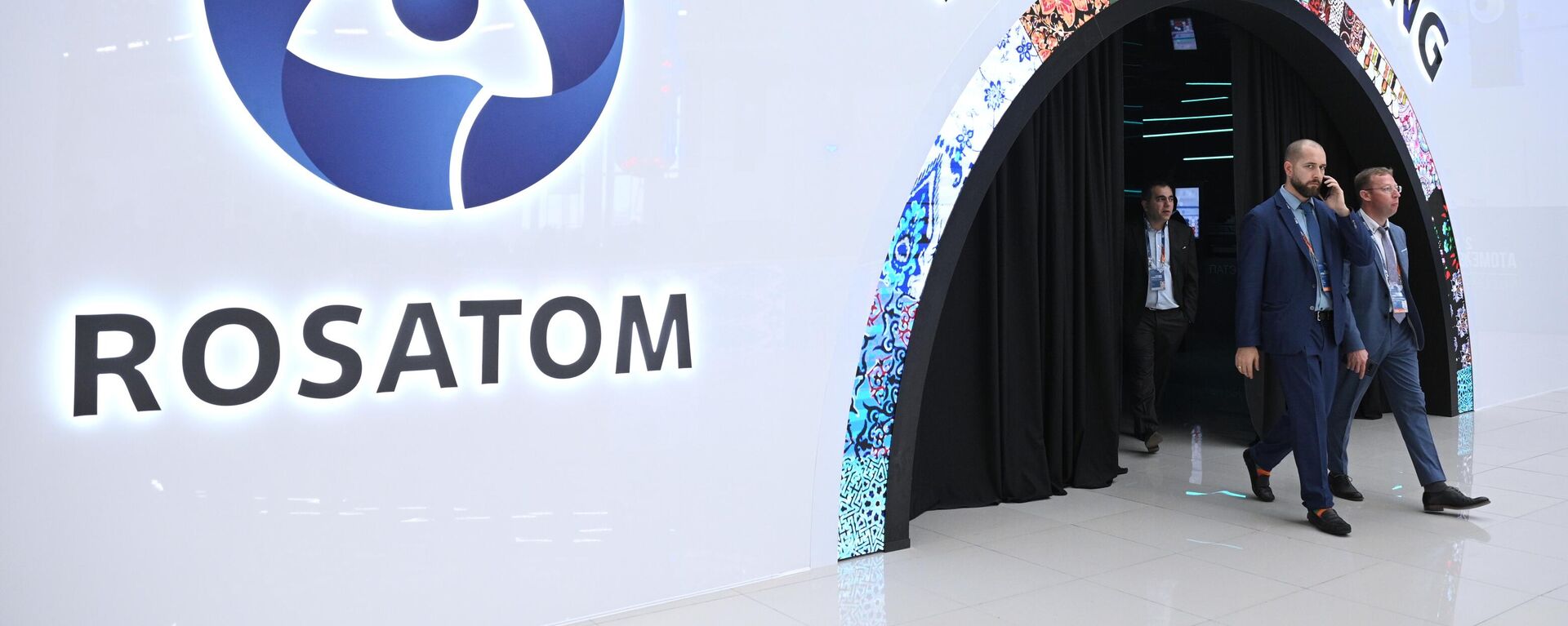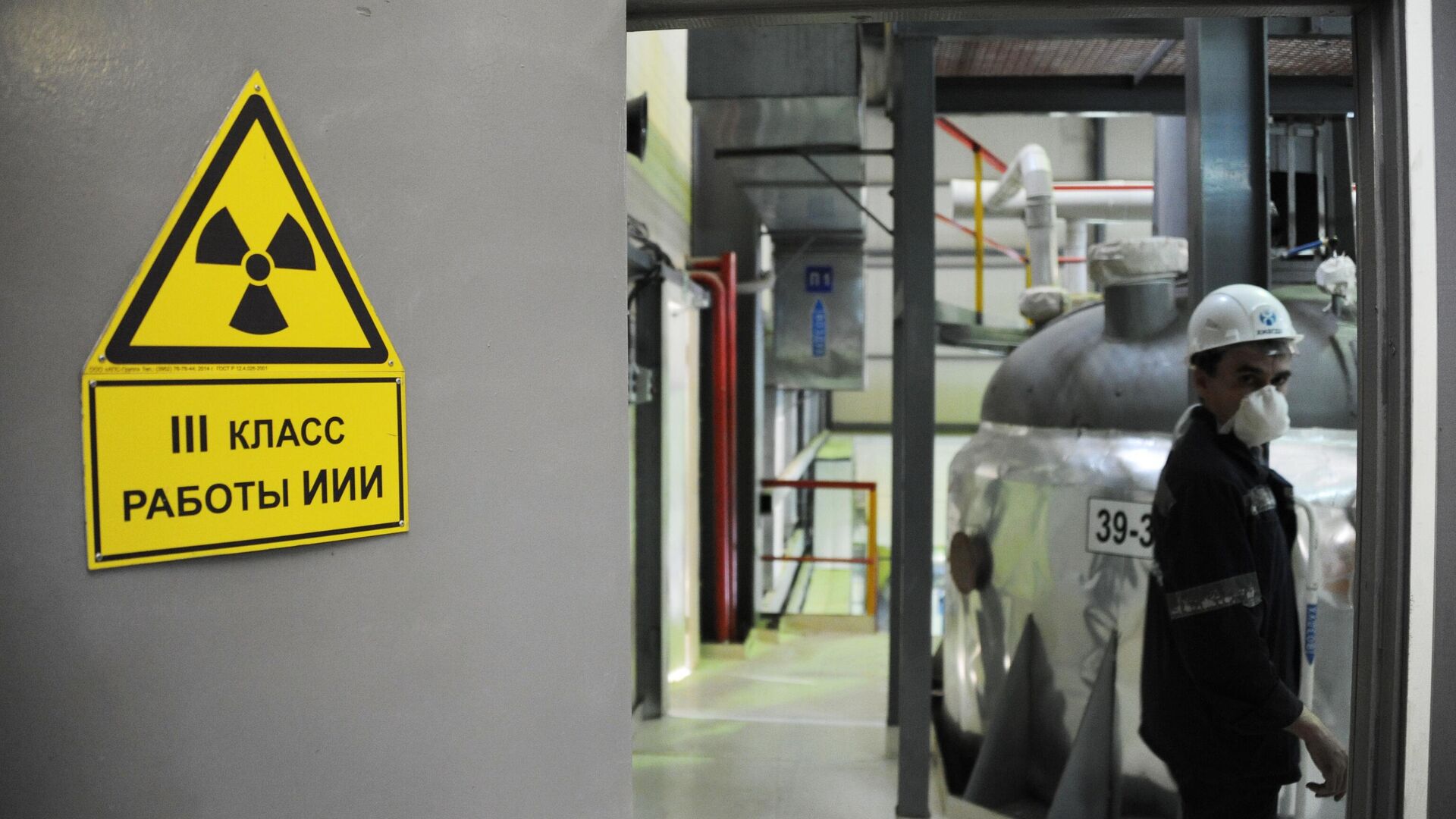https://sputnikglobe.com/20240126/us-push-to-cut-dependence-on-russian-uranium-ploy-to-form-cartel-to-strong-arm-sellers--1116399374.html
US Push to Cut Dependence on Russian Uranium, Ploy to Form Cartel to Strong-Arm Sellers
US Push to Cut Dependence on Russian Uranium, Ploy to Form Cartel to Strong-Arm Sellers
Sputnik International
The prospects of a joint plan by the US, France, Canada, Japan and the UK to cut reliance on Russian nuclear fuel are "vague," and bring to mind OPEC oil cartel, but with the “conditions reversed,” Alexey Anpilogov told Sputnik.
2024-01-26T15:05+0000
2024-01-26T15:05+0000
2024-01-26T15:05+0000
analysis
us
russia
nuclear energy
uranium
uranium enrichment
rosatom
opec
https://cdn1.img.sputnikglobe.com/img/07e7/08/18/1112838433_0:158:3077:1889_1920x0_80_0_0_f1d31917676fe1edc556fc7a70be7639.jpg
The prospects of a joint association by the US, France, Canada, Japan and the UK to cut reliance on Russian nuclear fuel sound "vague," and bring to mind the renowned OPEC oil cartel, but with the “conditions reversed,” Alexey Anpilogov, military analyst and head of the Foundation center, told Sputnik.Of the five countries that have joined the US plans to create a unified international nuclear fuel supply chain, only one country – Canada – has significant natural uranium resources, said the expert. He added that the remaining four are net consumers of uranium, and almost all, except for the US, do not even have significant reserves for mining uranium on their soil.Considering that in this version of the consortium “there are four uranium consumers, and one producer, believe that the prospects for this association are extremely vague,” said Alexey Anpilogov.Washington continues to push politically-motivated schemes to cut its dependence on nuclear fuel sourced from Russia. The US appears to have wheedled several G7 counties, namely, France, Canada, Japan and the UK, to get on board with its plans. Together, they have pledged $4.2bn to boost enrichment and conversion capacity.It should be noted that despite Washington’s push to end purchases of Russian energy exports around the globe, US consumers have acquired 3,142 metric tons of comparatively inexpensive uranium products from Russia between the first quarter of 2018 and the third quarter of 2023, as per data from S&P Global Market Intelligence. More than a fifth of the fuel used by nuclear reactors in the United States is supplied through enrichment contracts with Russia, predominantly its state nuclear corporation Rosatom.Rosatom is the world’s largest enricher of uranium, with 43% of total production capacity. Rosatom's TENEX is Russia's leading supplier of uranium products, representing the country's atomic industry on the global market.Last year, US lawmakers undertook a spate of efforts to sever the supply of enriched uranium to their country from Russia, despite the fact that any alternative uranium procurement strategy would be much more costly. A bill banning US imports from Russia’s Rosatom by 2028 was approved by a House subcommittee last May, but has stalled in Congress since.The bill in question, the Prohibiting Russian Uranium Imports Act, would also authorize the US Energy Secretary to issue a waiver to the ban if no other sources of uranium are available.The nuclear industry is experiencing a real revival, Alexey Anpilogov pointed out. "Countries such as China and India are actively boosting their nuclear capacities. We’re talking about dozens of gigawatts over the next 10 years. This is a very substantial amount of nuclear power generation," he said, adding that Russia and China supply about 60% of the newly constructed reactor fleet."Enriched uranium of reactor purity - with an enrichment of 3% to 5% - is then used in so-called fuel assemblies, or special high-tech parts of the reactor, which are complex engineering units and are incompatible with each other," according to the nuclear energy expert. Plainly put, fuel assemblies from Russian- or Chinese-made reactors are not suitable for those of American or European design, and vice versa, Anpilogov explained."So, what we are looking at is an already existing shortage of uranium now, and secondly, future nuclear construction projects will consume more uranium, with the US and its other allies in this ‘consortium’ vying for it," he added.As to what other countries might, in principle, join this kind of consortium led by the US, Australia, a "very serious player in the global uranium market," was singled out by Anpilogov.A few African countries, such as Namibia, Malawi, that do not have their own uranium processing technologies, might also be attracted to such a consortium, Anpilogov noted. But all of ‘Francophone Africa’ is now a "big question," he remarked, pointing to the events of recent years when "Niger, Mali, Gabon, and other countries fell out with one of these ‘consortium participants’ – France." These former French colonies that had been dominated by European companies which took the resources out of these countries at very low prices have been seeking to shed the vestiges of their past.But there are certain opportunities based on US ties in Central Asia, first of all, Kazakhstan, said Anpilogov.Last year, French President Emmanuel Macron paid official visits to Uzbekistan and Kazakhstan and held talks with their leaders. The purpose of his trips to the region was reportedly to improve France's energy security. In particular, in Kazakhstan, Macron was reported as discussing increasing oil supplies to France and uranium exports.Kazakhstan is a "sovereign state that develops ties at its own discretion," and Moscow and Astana have "strategic partnership ties," Kremlin Spokesman Dmitry Peskov said at the time. He added that "as for the uranium market, yes, it is competitive. But in this case, it is very difficult to overestimate the position of the Russian side in this market."Most of the above-mentioned possible sources for uranium, underscored Anpilogov, are associated with certain risks, either economic or political, with the possible exception of Canada, which is “truly the backyard of the US and is unlikely to pursue any particularly independent agenda from Washington."There is little doubt regarding the ulterior motives of any such consortium led by the US to slash reliance on Russia's nuclear fuel, considering that Washington thrives on weaponizing its plans to suit its own agenda.The US still has a huge nuclear reactor fleet, recalled the expert, slightly less than 100 operating power units, and nuclear energy provides the cheapest electricity. Furthermore, although the US has the fourth-largest uranium resources in the world, production plummeted to historic lows in the last 2-10 years. It’s the same story with ancillary services, such as conversion and enrichment, which are needed to fuel reactors. There are just two major Western suppliers of enrichment services, France’s Orano and Urenco, a UK, German and Dutch consortium, that the US relies upon. And then, about a third of enriched uranium is still supplied by the Russian Federation to the American market. Of course, Washington can never miss a chance to accuse Moscow of using this as “a lever of pressure,” but in fact no one is stopping the US from developing its own enrichment industry, stressed Anpilogov. The US uses Russian facilities because of the costs, reliability and overall convenience. Therefore, the US is purchasing Russian enriched uranium “at its own free will,” he emphasized. That explains why Russian uranium has remained a non-sanctioned product that is freely supplied to the American market.
https://sputnikglobe.com/20240110/us-seeks-to-build-up-enriched-uranium-supply-to-end-reliance-on-russia-1116102353.html
https://sputnikglobe.com/20231212/us-shoots-itself-in-foot-with-politically-motivated-ban-on-russian-uranium-imports-1115538909.html
https://sputnikglobe.com/20231215/russias-rosatom-rejects-reports-of-alleged-preemptive-cutoff-of-uranium-supplies-to-us-1115600921.html
russia
Sputnik International
feedback@sputniknews.com
+74956456601
MIA „Rossiya Segodnya“
2024
News
en_EN
Sputnik International
feedback@sputniknews.com
+74956456601
MIA „Rossiya Segodnya“
Sputnik International
feedback@sputniknews.com
+74956456601
MIA „Rossiya Segodnya“
us uranium imports, us uranium enrichment capacity, us russia uranium ban
us uranium imports, us uranium enrichment capacity, us russia uranium ban
US Push to Cut Dependence on Russian Uranium, Ploy to Form Cartel to Strong-Arm Sellers
Despite unprecedented Western sanctions backfiring on their most ardent proponents, and Russia repeatedly underscoring the importance of safeguarding nuclear energy from geopolitical turbulence and “protectionist restrictions," the US and its allies are actively exploring ways to end dependency on Russian fuel.
The prospects of a joint association by the US, France, Canada, Japan and the UK to cut reliance on Russian nuclear fuel sound "
vague," and bring to mind the renowned
OPEC oil cartel, but with the “
conditions reversed,”
Alexey Anpilogov, military analyst and head of the Foundation center, told
Sputnik.
“This is a kind of OPEC in reverse: an attempt to create a consortium or cartel of uranium buyers who will try to somehow impose their conditions on countries that sell natural uranium on the world market, trying to strong-arm them,” said the nuclear energy expert.
Of the five countries that have joined the US plans to create a unified international nuclear fuel supply chain, only one country – Canada – has significant natural uranium resources, said the expert. He added that the remaining four are net consumers of uranium, and almost all, except for the US, do not even have significant reserves for mining uranium on their soil.
Considering that in this version of the consortium “there are four uranium consumers, and one producer, believe that the prospects for this association are extremely vague,” said Alexey Anpilogov.

10 January 2024, 18:07 GMT
Washington continues to push politically-motivated schemes
to cut its dependence on nuclear fuel sourced from Russia. The US appears to have wheedled several G7 counties, namely, France, Canada, Japan and the UK, to get on board with its plans. Together, they have pledged $4.2bn to boost enrichment and conversion capacity.
It should be noted that despite Washington’s push to end purchases of Russian energy exports around the globe, US consumers have acquired 3,142 metric tons of comparatively inexpensive uranium products from Russia between the first quarter of 2018 and the third quarter of 2023, as per data from S&P Global Market Intelligence. More than a fifth of the fuel used by nuclear reactors in the United States is supplied through enrichment contracts with Russia, predominantly its state nuclear corporation Rosatom.
Rosatom is the world’s largest enricher of uranium, with 43% of total production capacity. Rosatom's TENEX is Russia's leading supplier of uranium products, representing the country's atomic industry on the global market.
Last year, US lawmakers undertook a spate of efforts to sever the supply of enriched uranium to their country from Russia, despite the fact that any alternative uranium procurement strategy would be much more costly. A bill banning US imports from Russia’s Rosatom by 2028 was approved by a House subcommittee last May, but has stalled in Congress since.
The bill in question, the Prohibiting Russian Uranium Imports Act, would also authorize the US Energy Secretary to issue a waiver to the ban if no other sources of uranium are available.
The
nuclear industry is experiencing a real revival, Alexey Anpilogov pointed out.
"Countries such as China and India are actively boosting their nuclear capacities. We’re talking about dozens of gigawatts over the next 10 years. This is a very substantial amount of nuclear power generation," he said, adding that Russia and China supply about 60% of the newly constructed reactor fleet.
"Enriched uranium of reactor purity - with an enrichment of 3% to 5% - is then used in so-called fuel assemblies, or special high-tech parts of the reactor, which are complex engineering units and are incompatible with each other," according to the nuclear energy expert. Plainly put, fuel assemblies from Russian- or Chinese-made reactors are not suitable for those of American or European design, and vice versa, Anpilogov explained.
"So, what we are looking at is an already existing shortage of uranium now, and secondly, future nuclear construction projects will consume more uranium, with the US and its other allies in this ‘consortium’ vying for it," he added.
Uranium naturally occurs in the soil, mostly in the form of U-238, but deposits also contain smaller amounts of U-235, a much more reactive isotope. Through a complex refining process, the U-235 is separated from the U-238 and concentrated, then formed into fuel rods that can be placed in nuclear reactors, where a nuclear reaction is induced to generate electricity. High-assay low-enriched uranium (HALEU) is the crucial material needed to run advanced nuclear reactors. At the moment, Russia remains the world’s only commercial producer of this type of fuel.
As to what other countries might, in principle, join this kind of consortium led by the US, Australia, a "very serious player in the global uranium market," was singled out by Anpilogov.
“Australia's problem is that its uranium reserves are mainly concentrated in a deposit called the Olympic Dam. In general, these are not uranium deposits, but rather gold and platinum deposits. As a result, the cost of uranium mining there hinges on the global gold market," he clarified.
A few African countries, such as Namibia, Malawi, that do not have their own uranium processing technologies, might also be attracted to such a consortium, Anpilogov noted. But all of ‘Francophone Africa’ is now a "
big question," he remarked, pointing to the events of recent years when "
Niger, Mali, Gabon, and other countries fell out with one of these ‘consortium participants’ – France." These former French colonies that had been dominated by European companies which took the resources out of these countries at very low prices have been seeking
to shed the vestiges of their past.But there are certain opportunities based on US ties in Central Asia, first of all,
Kazakhstan, said Anpilogov.
Last year, French President Emmanuel Macron paid official visits to Uzbekistan and Kazakhstan and held talks with their leaders. The purpose of his trips to the region was reportedly to improve France's energy security. In particular, in Kazakhstan, Macron was reported as discussing increasing oil supplies to France and uranium exports.
Kazakhstan is a "
sovereign state that develops ties at its own discretion," and Moscow and Astana have "
strategic partnership ties," Kremlin Spokesman Dmitry Peskov said at the time. He added that "
as for the uranium market, yes, it is competitive. But in this case, it is very difficult to overestimate the position of the Russian side in this market."
12 December 2023, 15:06 GMT
Most of the above-mentioned possible sources for uranium, underscored Anpilogov, are associated with certain risks, either economic or political, with the possible exception of Canada, which is “truly the backyard of the US and is unlikely to pursue any particularly independent agenda from Washington."
There is little doubt regarding the ulterior motives of any such consortium led by the US to slash reliance on Russia's nuclear fuel, considering that Washington thrives on weaponizing its plans to suit its own agenda.
The US still has a huge nuclear reactor fleet, recalled the expert, slightly less than 100 operating power units, and nuclear energy provides the cheapest electricity. Furthermore, although the US has the fourth-largest uranium resources in the world, production plummeted to historic lows in the last 2-10 years. It’s the same story with ancillary services, such as conversion and enrichment, which are needed to fuel reactors. There are just two major Western suppliers of enrichment services, France’s Orano and Urenco, a UK, German and Dutch consortium, that the US relies upon. And then, about a third of enriched uranium is still supplied by the Russian Federation to the American market.
Of course, Washington can never miss a chance to accuse Moscow of using this as “a lever of pressure,” but in fact no one is stopping the US from developing its own enrichment industry, stressed Anpilogov. The US uses Russian facilities because of the costs, reliability and overall convenience. Therefore, the US is purchasing Russian enriched uranium “at its own free will,” he emphasized. That explains why Russian uranium has remained a non-sanctioned product that is freely supplied to the American market.
“We exclusively act as reliable suppliers of uranium that have not used it as a weapon. Despite the sanctions imposed by the United States, we continue to supply American nuclear power plants with our Russian uranium,” Alexey Anpilogov added.

15 December 2023, 09:40 GMT




